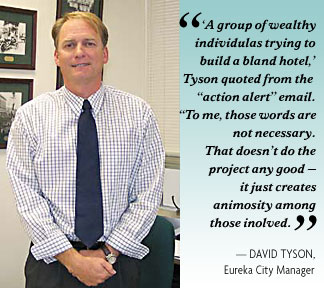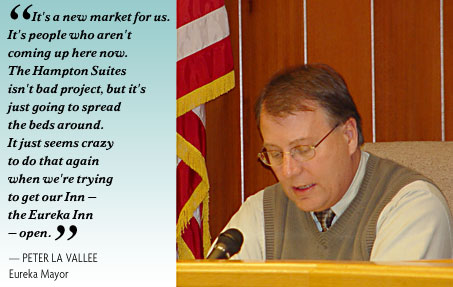|
COVER
STORY | IN THE NEWS | PUBLISHER | OPINION December 1, 2005
by HANK SIMS IF YOU'VE BEEN READING LETTERS TO THE EDITOR or opinion pieces in the newspaper, or even just your e-mail lately, you know: The latest skirmish in the county's culture wars, the next big fight over the future of the area, is over a vacant, weedy lot on the Eureka waterfront. On Sept. 27, the city of Eureka's Redevelopment Advisory Board voted 3-2 to recommend that the city award one of its waterfront parcels near the Wharfinger Building to a group wishing to build a hotel, to be called the Hampton Harbor Inn and Suites, part of the Hilton chain. In doing so, the board recommended against another proposal, the Humboldt Bay Hostel and Sustainable Living Center -- often called the eco-hostel. If the City Council does end up reversing the RAB's recommendation, the eco-hostel would likely be the most architecturally significant new building that the city has seen in decades, perhaps since the days of the Carson Mansion and the Eureka Inn. The project's backers -- and there are some nationally known names among them -- believe that it will serve as the focal point for visitors coming to experience the county's natural beauty, and that it will draw people to the area. As the hostel is currently designed, it will also house a crew of Humboldt State University students, who will staff the hostel and use the center as a base for scientific research on Humboldt Bay and alternative energy. HSU President Rollin Richmond is a strong supporter. If the City Council sticks with the RAB, Eureka will get another chain hotel -- a nice one, on the upper end of the scale for such chains, but there's really not much more to say for it, architecturally. It'll have a conference room, and stands a good chance of capturing business travelers. So why does the eco-hostel face a steep uphill fight -- one that's getting still steeper every day, as the run-up to the City Council's decision this Tuesday night approaches? Why, when it was originally the city of Eureka that pitched the waterfront site to the eco-hostel people, and not the other way around? There are a few different answers to these questions. First, and as several RAB members stated in justifying their vote, the Hampton Suites is on much more solid financial footing. The people behind the project, Greg Pierson and Larry DeBeni, are well-known developers in Eureka. They came to the RAB with letters of credit in hand from three different banks, all of them promising funding for the project. (One of those letters was from Umpqua Bank, whose vice-president, Evelyn Giddings, sat on the RAB and voted for the project). They came armed with financial projections showing that the city stood to gain some $270,000 per year off the project. These revenues would come from the lease of the site, from property taxes and from the standard bed tax imposed by the city on hotels.
As member Lance Madsen noted, the Redevelopment Advisory Board has a narrow focus -- it is charged with gauging potential projects as investments, not as matters of public policy. The City Council could conceivably ignore the RAB's recommendation and go with the hostel on other grounds. The people at CEED certainly hope that will be the case, and they're making every effort to make the case to the public that the hostel would attract new tourists to the area and would be a boon to the regional economy. But given the current state of politics in Eureka, the effort to rally the citizenry to the hostel's side is less likely to revive the hostel than damn it for good. The person who came up with the idea for the eco-hostel is Lew Litzky, a 71-year-old Arcata resident and former president of American Youth Hostels, Inc. (now called Hostelling International USA). Litzsky said recently that he came up with the idea of a hostel that would demonstrate sustainable living and energy practices even before he retired to the area from San Francisco a few years ago. It was just a concept, originally -- an idea to kick around in his head. But he said that once he and his wife relocated to Humboldt County permanently, he realized that it was a perfect fit for the idea. "Once you have a destination place for ecotourism, people will come up here," he said. "We're convinced about that." Litzky's credentials, and the credentials of the team he has assembled to build the hostel, are impeccable. As president of the national hostelling association, he oversaw construction of major new facilities in New York, Boston and Seattle. Apart from his colleagues at CEED (he is a member of the organization's board of directors), he has also enlisted the support of a number of impressive names. His architect is Sim Van der Ryn, former California State Architect and an internationally known figure in the world of sustainable design. Amory Lovins, an influential thinker on energy issues, is a member of his advisory board. He received a $50,000 grant from the Ford Foundation to study the feasibility of the eco-hostel, and the foundation's president, Susan Berresford, has written the City Council in support of the project. The current designs for the
project call for accommodations for 60 guests, most of which
would be in the form of double-occupancy rooms. There would be
a few traditional, European-style hostel rooms available as well,
for backpacker-type tourists. A separate facility would house
HSU students. Several straw bale or cob buildings, demonstrating
alternative construction techniques, would eventually be added
to the rear of the facility and rented to tourists. Litzky is
working on getting HSU's Schatz Energy Lab to place some of its
research activities on the site. It would contain a great deal
of public space, open to all who wished to tour along the waterfront,
and there would also be an interpretive center noting the history
of the Wiyot Tribe around the bay. This somewhat final form of
the project only took place after Litzky and CEED looked at a
number of other sites in and around Arcata and Eureka, none of
which panned out. Earlier in the spring, after Litzky had spoken to Eureka City Councilmember Chris Kerrigan about the project, Kerrigan arranged for Litzky's colleagues to take a tour of the waterfront parcel near the Wharfinger with city staff, and invited him to bid for a lease from the city redevelopment agency, which owns the lot. According to Litzky, city staff members seemed excited about the prospect of bringing the hostel to the site. The site was put out to public bid shortly afterward, with both the eco-hostel and the DeBeni/Pierson team submitting proposals. Left: Eureka City Manager David Tyson But whatever support Litzky sensed back then has faded somewhat since the RAB took its two votes on the project. (On Oct. 25, the RAB again voted to support the Hampton Suites after Giddings withdrew her vote after murmurs about her potential "perceived conflict of interest" in the case began to hit the media.) Two weeks ago, city officials including Councilmember Jeff Leonard took Litzky on another tour of potential sites for the hostel, including a few sites near the Palco Marsh, which runs from behind the Bayshore Mall to the public pier at the foot of W. Del Norte Street. Since his setback at the RAB, Litzky is less sanguine about the hostel's eventual chances next week. He hasn't thrown in the towel yet, though. "Quite honestly, it's going to be an uphill struggle until we get the community involved," he said. In that regard, at least, Litzky is getting his wish. It's doubtful, though, whether it will have the effect he intends it to have. In the run-up to the Thanksgiving holiday, two organizations sent out "action alerts" urging the public to show its support for the hostel. One was Local Solutions, the leftish political action committee that sprang out of the successful effort beating back the recall of District Attorney Paul Gallegos last year. The other was Democracy Unlimited of Humboldt County, the Eureka-based group headed by Green Party presidential candidate David Cobb and his partner Kaitlin Sopoci-Belknap, a member of the Humboldt Bay Municipal Water District's board of directors. The Humboldt Bay Stewards have scheduled a public informational forum on the hostel project at 6:30 p.m. Thursday, Dec. 1, at the Red Lion Inn. And earlier that day, Mayor Peter La Vallee plans to hold a press conference in which he is expected to announce his support for the hostel and ask the public to come out to the council's meeting next week. "It's a new market for us," La Vallee said in an interview last week. "It's people who aren't coming up here now. The Hampton Suites isn't a bad project, but it's just going to spread the beds around. It just seems crazy to do that when we're trying to get our Inn" -- the Eureka Inn -- "open." But it's questionable whether taking this fight to the streets will have anything but a counterproductive effect, at least on the question at hand. Eureka is a divided city, both culturally and politically, and there is a strong fear in certain quarters that the town may fall into the hands of progressives the people derisively thought of as "Arcata types." To this crowd, the eco-hostel, down to its very name, symbolizes everything the progressive faction stands for. The "action alerts" from progressive groups only underline this. And if recent history is
anything to go by, on land use questions the City Council is
dominated by what could be called the "backlash" faction.
Earlier in the year, first Councilmember Jeff Leonard and then
Councilmember Mary Beth Wolford torpedoed La Vallee's first two
nominations to the city's planning commission -- both progressives,
far removed from the town's old guard -- on the grounds that
the issue had become "politicized." They joined two
other councilmembers, Mike Jones and Virginia Bass-Jackson, in
voting against the mayor until he appointed someone they were
comfortable with. Though the backlash view is most often expressed
quietly and under the table, it was well articulated in an editorial
in last Sunday's Eureka Reporter, the newspaper owned
by local businessman and developer Rob Arkley, who is in negotiations
to buy the Balloon Track site directly across from the waterfront
parcel in question. The editorial, was titled "Hampton Inn
is the best choice." "Despite its protestations to the contrary, Local Solutions is a leftist anti-corporate political action committee that seeks to muscle its narrow view of the world on the Eureka City Council and Eureka residents regarding the Hampton Harbor Inn," the article began. Right: Peter
La Vallee, On Tuesday, Eureka City Manager David Tyson said that city staff were preparing their recommendation to the council, and that he could not say which project the staff would recommend until the report was complete and forwarded to council members. But Tyson did say that the calls to action coming from Local Solutions and others -- not CEED or Litzky, he said -- didn't do their case any favors. "'A group of wealthy individuals trying to build a bland hotel,'" Tyson quoted from the "action alert" e-mail. "To me, those words are not necessary. That doesn't do the project any good -- it just creates animosity among those involved." COVER
STORY | IN THE NEWS | PUBLISHER | OPINION Comments? Write a letter! © Copyright 2005, North Coast Journal, Inc. |

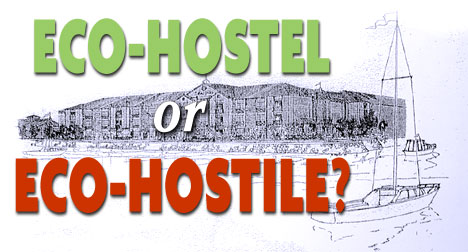
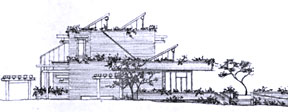 By
contrast, the eco-hostel people -- led by Arcata's Center for
Environmental Economic Development -- had several very good
prospects for funding, but no cash in hand. The hostel would
be financed by private charitable foundation money -- some $3
million would be needed -- and the foundations would be loathe
to send checks until they had a site in hand, according to the
CEED presentation to the Redevelopment Advisory Board. The fund-raising
campaign was projected to take two years. In addition, the financial
returns to the city's redevelopment agency would not be as great,
though CEED argued that the returns from the Hampton Suites project
would be offset by losses in business from other hotels in the
area.
By
contrast, the eco-hostel people -- led by Arcata's Center for
Environmental Economic Development -- had several very good
prospects for funding, but no cash in hand. The hostel would
be financed by private charitable foundation money -- some $3
million would be needed -- and the foundations would be loathe
to send checks until they had a site in hand, according to the
CEED presentation to the Redevelopment Advisory Board. The fund-raising
campaign was projected to take two years. In addition, the financial
returns to the city's redevelopment agency would not be as great,
though CEED argued that the returns from the Hampton Suites project
would be offset by losses in business from other hotels in the
area.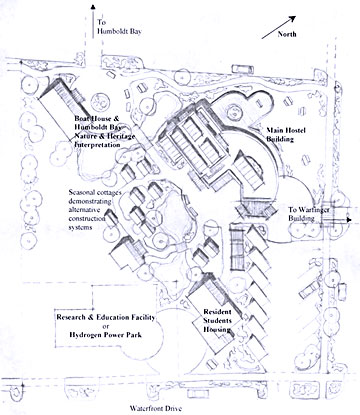 Above and left: Humboldt Bay Hostel
and Sustainable Living Center rendering and plot plan.
Above and left: Humboldt Bay Hostel
and Sustainable Living Center rendering and plot plan.